The Houston Rockets and Utah Jazz were two of the NBA’s titanic franchises of the 1990s. Houston had back-to-back championships (😀) while Utah had back-to-back Finals appearances (chortles).
Ed. Note: I grew up a Rockets fan and despised the Jazz mostly because of Karl Malone. This will evidence itself throughout the article.
Prior to their 1998 playoff series, the Rockets and Jazz had met twice before in the postseason during the 90s. In the 1994 playoffs, Houston easily handled Utah in the Western Conference Finals. Hakeem Olajuwon manhandled the Jazz for 27.8 PPG, 10.2 RPG, 4.6 BPG, 4.4 APG, and 2.6 SPG in nearly 45 minutes a contest. Importantly he shot 50% FG and 80% FT (😀). On the other side, Utah’s foremost star, Karl Malone, had great counting stat: 26.0 PPG, 12.6 RPG, and 5.2 APG. However, he shot an underwhelming 43% FG and 71% FT (chortles).
Utah lost the series in five games, Houston went on to win the title.
The next time Houston and Utah met in the WCF, a lot had changed.
Utah’s top three players (Malone, John Stockton, and Jeff Hornacek) remained the same. For Houston, Olajuwon was the only superior mainstay still around, although key guard Mario Elie also remained. Elsewhere, the rosters were dramatically different. The Jazz won the 1997 series 4-2 as they headed to their first NBA Finals. That series victory made this 1998 rubber match between Houston and Utah all the more dramatic as these two teams clashed one last time in the ‘90s.
ALL IN ON GERIATRICS
After winning the title in 1994 (and 1995), the Rockets were convincingly swept in the 1996 Western Conference Semi-Finals by the Seattle SuperSonics. The sweep was somewhat surprising because the Rockets in 1994 (and especially 1995) had routinely overcome seemingly better teams and impossible situations. But the 64-win Sonics brutalized the 48-win Rockets something wicked.
The core of Olajuwon, Elie, Robert Horry, Sam Cassell, Kenny Smith, and ‘95 addition Clyde Drexler was detonated.
Olajuwon, Elie, and Drexler remained, but Horry and Cassell were part of the trade that brought in the ever-disgruntled Charles Barkley from Phoenix. Smith was flat-out cut from the roster.
Besides Barkley, Houston welcomed in a gaggle of other veterans as they made one final push for a title.
In August 1996, Houston signed Kevin Willis to backup Olajuwon and Barkley at center and power forward. All three players were members of the 1984 draft. In March 1997, the Rockets further honed in on the elderly by signing guard Sedale Threatt and small forward Eddie Johnson. At 29, forward Matt Bullard was the spring chicken of this new group. He previously had been a Rocket, but had been absent the last two seasons.
With so many established (and well-paid) vets, the rest of Houston’s roster was filled out with less-than-stellar youngsters. These players weren’t bad, they were just out of their depth. And at the end of the day, Matt Maloney was the only player under age 29 who was in Houston’s regular nine-man rotation. And he was 25. This was no country for young men.
ON A HIGH NOTE
While Houston willingly gambled on an elderly gambit, the Jazz kind of fell into their old roster.
Stockton and Malone had been teammates for over a decade and had seen all their old mates fall by the wayside. No more Mark Eaton. No more Thurl Bailey. No more Felton Spencer.
And in come the replacements!
Jeff Hornacek (by 1997 he was 33 years old; 11th season) was basically the same age as Stockton and Malone; but since he was two years younger than Jeff Malone (the previous starting shooting guard) Horny counted as a youthful(ish) injection.
Bryon Russell (26; 4th season), however, was genuine youth. He was a rookie in 1994 when Utah was defeated in the WCF and barely received playing time that season and the next two. For the ‘97 season Russell was promoted to the starting small forward gig.
He represented Utah’s commitment to finding young(ish) players with room for growth… or at least weren’t in imminent danger of decline. Over time they also acquired Shandon Anderson (23; rookie), Adam Keefe (26; 5th season), Greg Foster (28; 7th season) and Howard Eisley (24; 3rd season). Again none of these guys were very good, but they also didn’t require IcyHot on a regular basis.
There was also Greg Ostertag (23; 2nd season).
But don’t worry, Utah had its fair share of old-ass additions. Specifically the splendid Antonie Carr (35; 13th season). Of lesser note was Chris Morris (31; 9th season), but hey gotta give the early 90s New Jersey Nets some love.
Somehow, someway, Utah’s general continuity of Stockton and Malone (and Hornacek (and Sloan)) plus these capable scraps culminated with a 64-win season in 1996-97, the best in franchise history.
BREAK OUT THE BENGAY
The ‘97 Rockets won 57 games of their own tying for second-place in the conference with the Sonics. Mercifully, Houston had the tiebreaker over Seattle cuz Houston always got trucked by Seattle in the playoffs. The two teams went to seven games in the WCSF. With the final game at home, Houston prevailed 96-91.
As for Utah, they matched up with the 56-win Los Angeles Lakers. The Lakers were outmatched by the veteran club losing in five games. Their time would come, but it wasn’t today.
Thus came Houston’s and Utah’s ‘97 showdown.
Utah prevailed in six games as mummies roamed the court. I keep stressing this point, but it needs stressing. The average age of Utah’s nine-man rotation was 29 years. Houston’s was 32.
THIRTY-TWO!
The Rockets’ age-induced brittleness came home to roost mightily for the 1997-98 season.
Olajuwon played only 47 games that year while Barkley appeared in just 68 games—27 of them as a bench player. Drexler managed 70 games, but his play was what you’d expect of 35-year-old high-flyer.
The stalwart was Willis who played 81 games. With all the injury and weakness, Houston fell to 41 wins. But when the gang was altogether and healthy, Houston was still a potent threat as we’ll see.
As for Utah, they essentially returned the same roster from 1997 and proceeded to win 62 games. Tied for best in the NBA. However, the competition was hot on their heels. Seattle and LA both won 61 games. The Sonics were themselves teetering on the edge of geriatric, but the Lakers were the clear looming titans on the horizon. However, San Antonio had just acquired Tim Duncan and they had 56 wins that year, too.
If Utah was to win its title, this was realistically their best year to do so before LA and San Antonio surpassed them with Seattle as an outside threat. Houston was just hoping to remember where the car keys were.
Thus came this truly quirky Almost Upset where two teams with their final chance for a title met in the first round.
WARNING: You’re gonna see some hideous late 90s final scores
GAME 1: HOUSTON 103 — UTAH 90
Well this was delightfully embarrassing for the Jazz. A double-digit blowout loss at home. At one point, Utah was down by as much as 22 points.
Houston had good (or at least good enough) performances from its mainstays of Olajuwon, Drexler, Barkley, and Willis.
Olajuwon: 16 points, 13 rebounds, six blocks, and five assists.
Drexler: 22 points, six assists
Barkley: 12 points, five rebounds
Willis: 18 points, 14 rebounds
Giving Houston even more lift was backup guard Brent Price who proved most daggerous—yes, daggerous. In just 14 minutes, Price hit four of this six three-point attempts. In particular during the second quarter, Price hit three threes in a three-minute span that pushed Houston’s lead from 29-25 to 43-31 to firmly put Houston ahead the rest of the game.
Drexler drove the stake further into Utah in the third quarter as Clyde the Glide scored 13 points in that period compared to Utah’s 14 as a team. The Jazz shot just 3-14 while also committing seven turnovers in the period. Probably didn’t help that Hakeem had five of his blocks in the third. Just a straight-up seizure of control by Houston.
Rockets guard Mario Elie, who also scored 12 points off the bench, was talking big shit after the game.
GAME 2: UTAH 105 — HOUSTON 90
Well, Utah didn’t have much trouble in this game. They pounced early scoring a 29-19 edge in the first quarter led by Hornacek’s nine points in the frame.
After a brief reprieve in the second quarter, another Utah blitz followed in the third. Stockton and Malone combined for 19 points on 7-8 FGs and 5-6 FTs in the period.
The only Rocket who had a semblance of a good game was Olajuwon: 16 points on 6-11 FGs. Even Hakeem the Dream committed four turnovers and made just four of his eight free throws. It was a horrible game for Houston.
But if you can’t win the game, you might win the fight!
The frustrated Rockets grumpily whacked away at the Jazz. Drexler and Hornacek nearly got into a fight after the Glider deliberately pinned and wrenched Hornacek’s arm on a drive. Earlier, Elie intentionally tripped Bryon Russell. Barkley with about five minutes left threw his arm into a driving Stockton drawing a flagrant foul. Didn’t matter because it was already Barkley’s sixth personal foul, so he was going to be ejected anyways.
Even the zenful Olajuwon picked up two technical fouls in quick succession for griping to the referees just 30 seconds before Barkley leveled Stockton.
Quite obviously the Rockets lost their cool and were flummoxed at their situation.
GAME 3: HOUSTON 89 — UTAH 85
Before we go any further, let’s appreciate the fact that these two teams combined for 13 illegal defense calls in this game including three such calls in a four possession span.
The Rockets still couldn’t really shoot straight, but their Phi Slama Jama alumni solidly anchored the win. Olajuwon had 28 points, 12 rebounds, and 10-26 FGs. Drexler was better from the field (8-18) and had a spritely 22 points, nine boards, and five dimes.
Still coming off the bench, Barkley had eight points and six rebounds… and importantly a game-sealing steal despite playing with a hernia.
Having missed over 30 games that year because of knee surgery, Olajuwon commented, “I feel strong and comfortable. I want to keep it that way. We have everybody healthy. This is a do-or-die situation and we are playing better as a team.”
Despite the better play, Houston’s victory nearly wasn’t.
After leading the entire game, the Rockets lost their edge after Stockton sank two free throws with 44 seconds left in the game. Now down 85-84, the Rockets proceeded to close out this garish game with five free throws—two by Olajuwon, two by Drexler, one by Matt Maloney.
Coach Sloan appreciated Houston’s game, but also noted, “You give them the rest they’ve had and they can beat anyone.”
Indeed, Game 2 was on April 25 while Game 3 was on April 29. That long lay off gave Houston’s elderly joints the juice to squeeze out this win. Unfortunately for them, the rest of the series would have the typical every-other-day playoff schedule.
So although the Jazz were also an old team they weren’t as old as Houston and their senior citizens were in better health.
GAME 4: UTAH 93 — HOUSTON 71
That better health was handy in Game 4. Houston jumped out to a 21-10 first quarter lead, but subsequently was stomped by Utah 83-50 for the rest of the game. Much of that was back-loaded into the fourth quarter where Utah blitzed Houston, 28-10.
The Jazz shot an incredible (for this series) 47.9% from the field. Malone eviscerated Houston for 29 points (11-22 FGs, 7-8 FTs) and 14 rebounds. Wingmen Russell and Anderson combined for 30 points on 10-18 FGs.
On the other side of the court, Houston’s age was fully showing.
Hakeem had 27 points, 15 rebounds, and five blocks. However, he shot a miserable 10-29 FGs. Shockingly his .345 FG% lifted up the Rockets’ average. Non-Olajuwon Rockets shot 16-51 (.314).
So what the hell happened to Houston?
Well, Barkley finally broke down.
Remember the Rockets had an 11-point lead after one quarter. After the Jazz cut the lead in half by halftime, Houston still managed to fight back up to another 11-point lead four minutes into the third quarter.
But the lead was obviously illusory.
Barkley was lost in the second quarter after taking an accidental elbow from Antoine Carr. The elbow essentially disabled Barkley’s shooting arm and he was out for the rest of the series with a torn triceps muscle.
Without Barkley as a secondary source of scoring (4-5 FGs in his eight minutes before getting knocked out), Houston had to overly rely on Olajuwon, hence his astronomical shot totals.
Rudy T knew Houston had lost their best chance to win the series and were in serious trouble now.
GAME 5: UTAH 84 — HOUSTON 70
Houston just ran out of steam in this one.
Without Barkley and with all their ailments, the Rockets were consistently within striking distance for most of this game… threatening Utah with upset humiliation… but they never had the power to fully get over the hump.
That’s what happens when you gamble on Geritol.
Absent Barkley, Willis stepped up big time with 16 points and 11 rebounds. Importantly he shot a scorching 7-13 FGs. Again it’s all relative. We’ll see some awful shooting in a second. Olajuwon had 15 points on 7-19 FGs while rookie Othella Harrington had an unexpected 10 points on 4-8 FGs.
The shooting horror show came from Drexler.
In his final NBA game, he shot 1-13 from the field and even just 4-10 FTs. It was a unfortunate end to such a glorious career. At least Utah fans gave him an ovation when it was over.
Was the ovation for a great career? Or for a horrible performance that helped their Jazz move on? A little bit of column A, a little bit of column B.
For Utah, Malone again ran wild: 31 points, 15 rebounds, five assists, 12-22 FGs, and 7-9 FTs. Hornacek also torched Houston with 15 points on 7-9 FGs.
Hell, even Greg Ostertag swatted seven shots! You know Olajuwon was getting toward the end of his career when Ostertag was giving him the business.
I’m having a terrible time. I’m tired of this damn series.
TWILIGHT
After beating Houston, the Jazz went on to fend off rookie Tim Ducan’s Spurs in five games in the semi-finals. They then swept Shaquille O’Neal’s Lakers in the conference finals.
Thus, miraculously, it was the twilight Rockets who gave Utah its hardest challenge in the Western Conference, not the rising powers who would dominate the ensuing decade.
Maybe there was something worthwhile in Houston’s Geritol gambit after all…
Anyways, the Jazz, of course, lost to the Chicago Bulls in six games (again) in the NBA Finals. Stockton and Malone would never get back to the Finals, but the ageless wonders still pulled off a 53-win season in 2001 losing to Dirk Nowitzki’s Dallas Mavericks by one point in Game 5 of the first round.
Even in 2002, the 44-win Jazz still gave the 61-win Sacramento Kings hell in a series almost worthy of an Almost Upset article. At that point, the Jazz band finally broke up as Stockton retired and Malone haplessly ring-chased for the Lakers.
The Rockets’ demise was much more brutal.
As mentioned, Drexler retired after the ‘98 series and had a brief, miserable stint as coach of the University of Houston’s men’s basketball team.
The Rockets tried prolonging their title window in 1999 by acquiring Scottie Pippen in an ill-fated Big Three with Olajuwon and Barkley. Hakeem was fine with Pip and Pip was fine with Hakeem.
Barkley and Pippen got along about as well as oil and water.
In their one, lockout shortened season together, the trio went 31-19 and lost in the first round to the Lakers. The Rockets put up a decent fight, but no one was shocked or surprised at the assured 3-1 series win by LA.
Quickly trading away Pippen to Portland, Houston also swung a separate deal to get disgruntled rookie draft pick Steve Francis from Vancouver. The team finished with 34 wins in 1999-00, but the season was more miserable than the win total suggests.
Barkley intended to retire that season anyways, but a knee injury ruined the farewell tour and he played just 20 games that year. He did haul ass through rehab and was able to play in the season finale. He obviously didn’t play well, but it was great to see Barkley go out on his own terms and not by injury.
As for Olajuwon, for the first time in his career he was relegated to supporting player status. Not surprising for a 37-year-old center. He appeared in just 44 games and a third of those he was backing up Kelvin Cato.
KELVIN CATO.
Having grown up with Hakeem as my favorite player, I’m still mad about it all these years later.
Anyways, Olajuwon’s career should have ended with more dignity than it did, but of course it didn’t. First of all, the 2001 Rockets won 45 games. Which is great! But they didn’t qualify for the playoffs in the hyper-competitive West. 44-win Seattle also missed the playoffs.
Secondly, Olajuwon got his starting job back only to watch Francis dribble in circles forever. Something else I’m still mad about all these years later.
At least Kenny Thomas was fun to watch. That man had some work ethic.
Lastly, the Rockets dicked around with Hakeem and let him walk as a free agent that offseason. For two decades Olajuwon was the best thing going in Houston sports. He reached the NCAA Final Four three times with the University of Houston and then the NBA Finals three times (winning it twice) with the Rockets. Ain’t nobody else come close to that in Houston.
But the Rockets got cheap and Olajuwon finished his career with one season in Toronto.
The Rockets almost upset the Utah Jazz in 1998, but it’s almost 2021 and I’m still upset about how Olajuwon’s time as a Rocket ended.



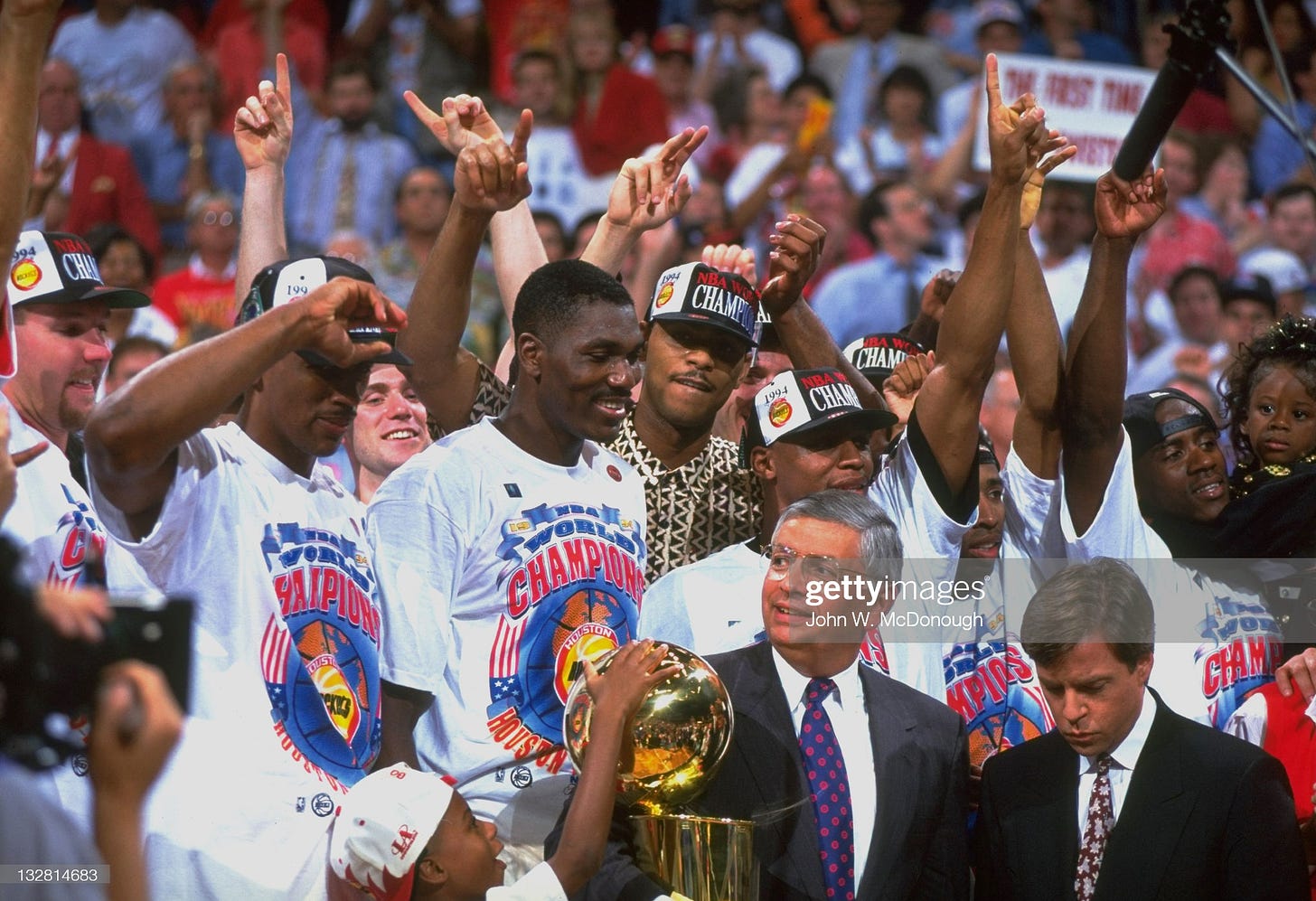

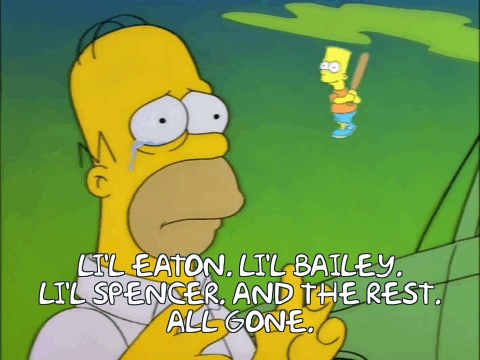
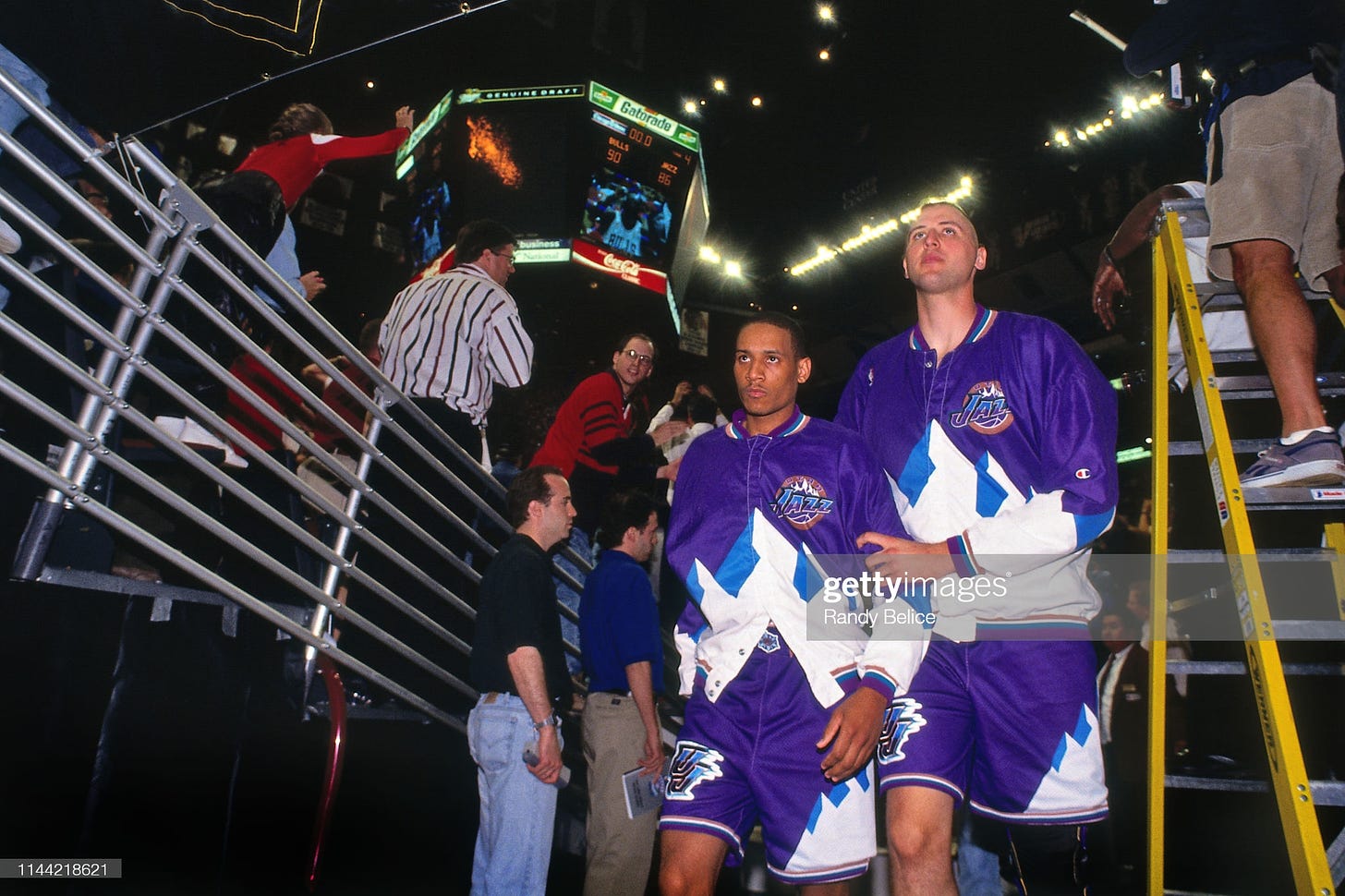
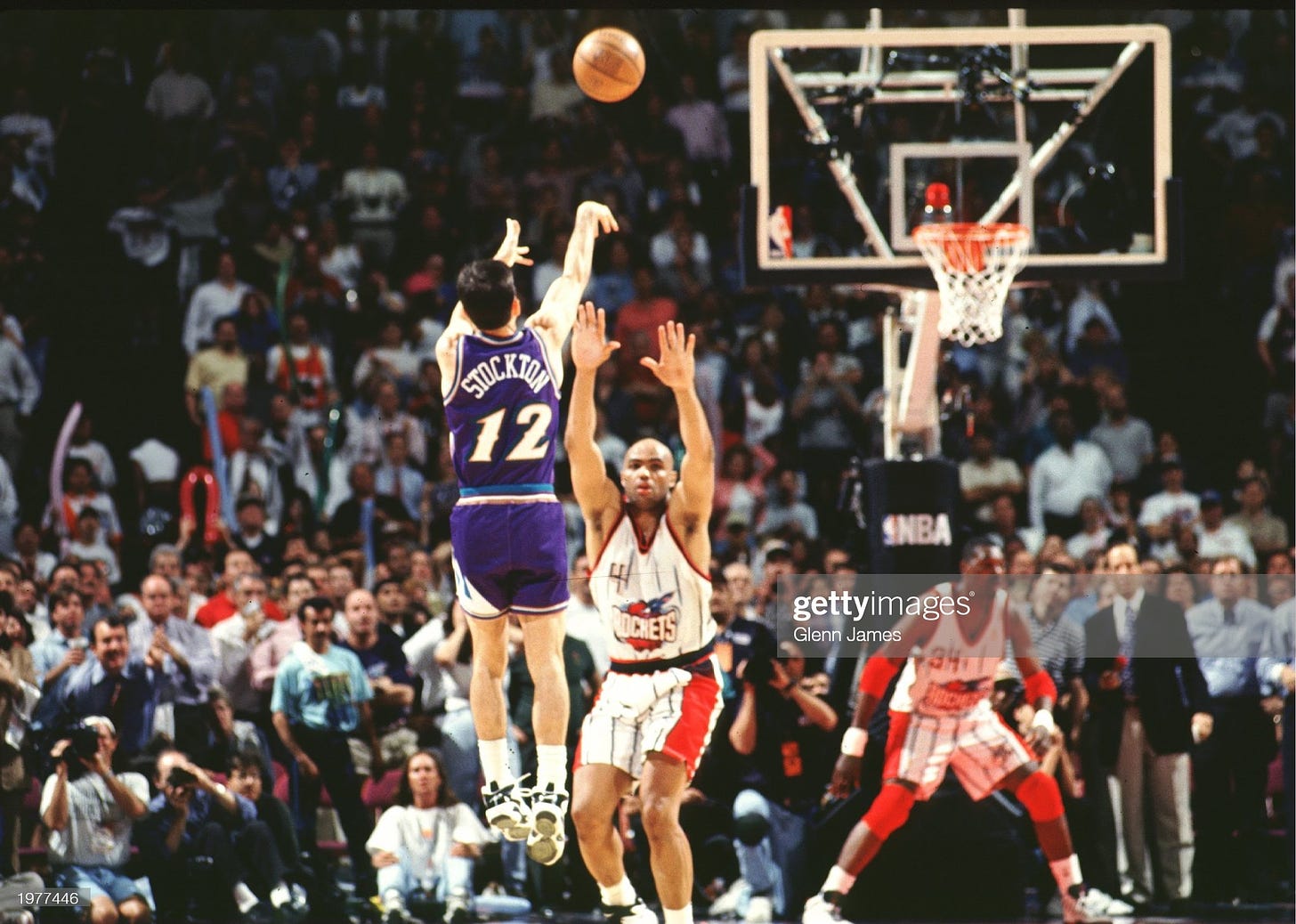

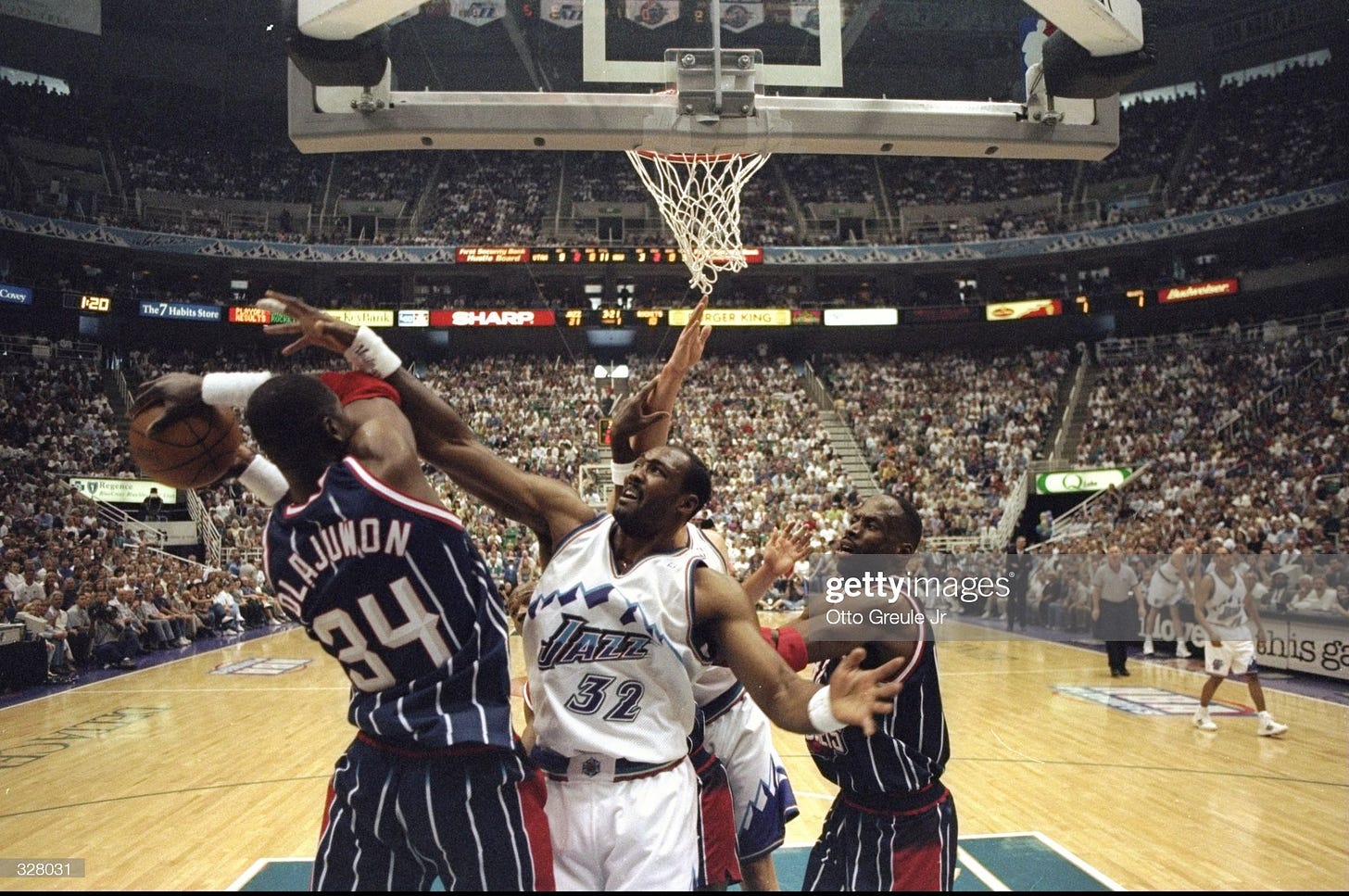
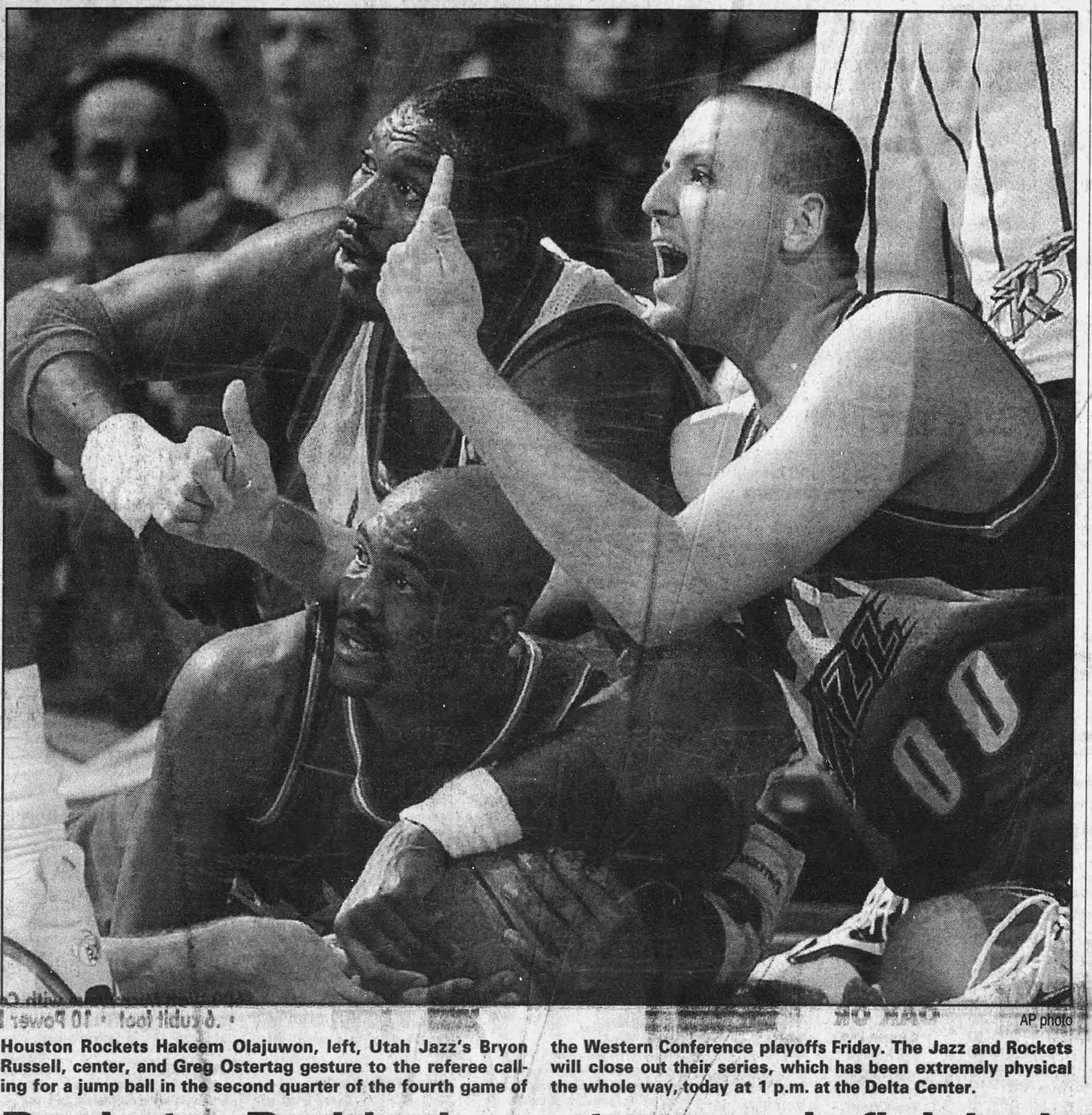

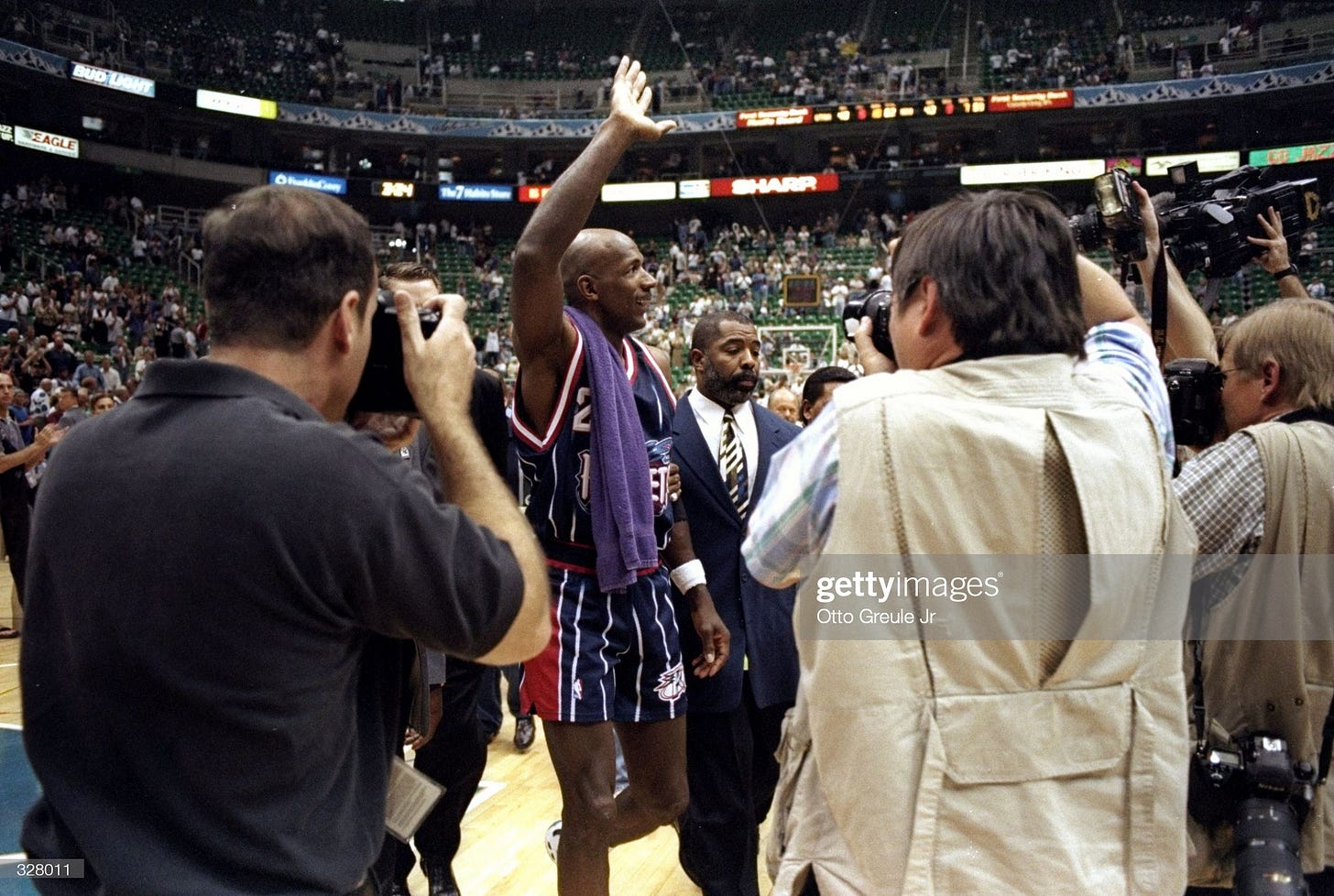
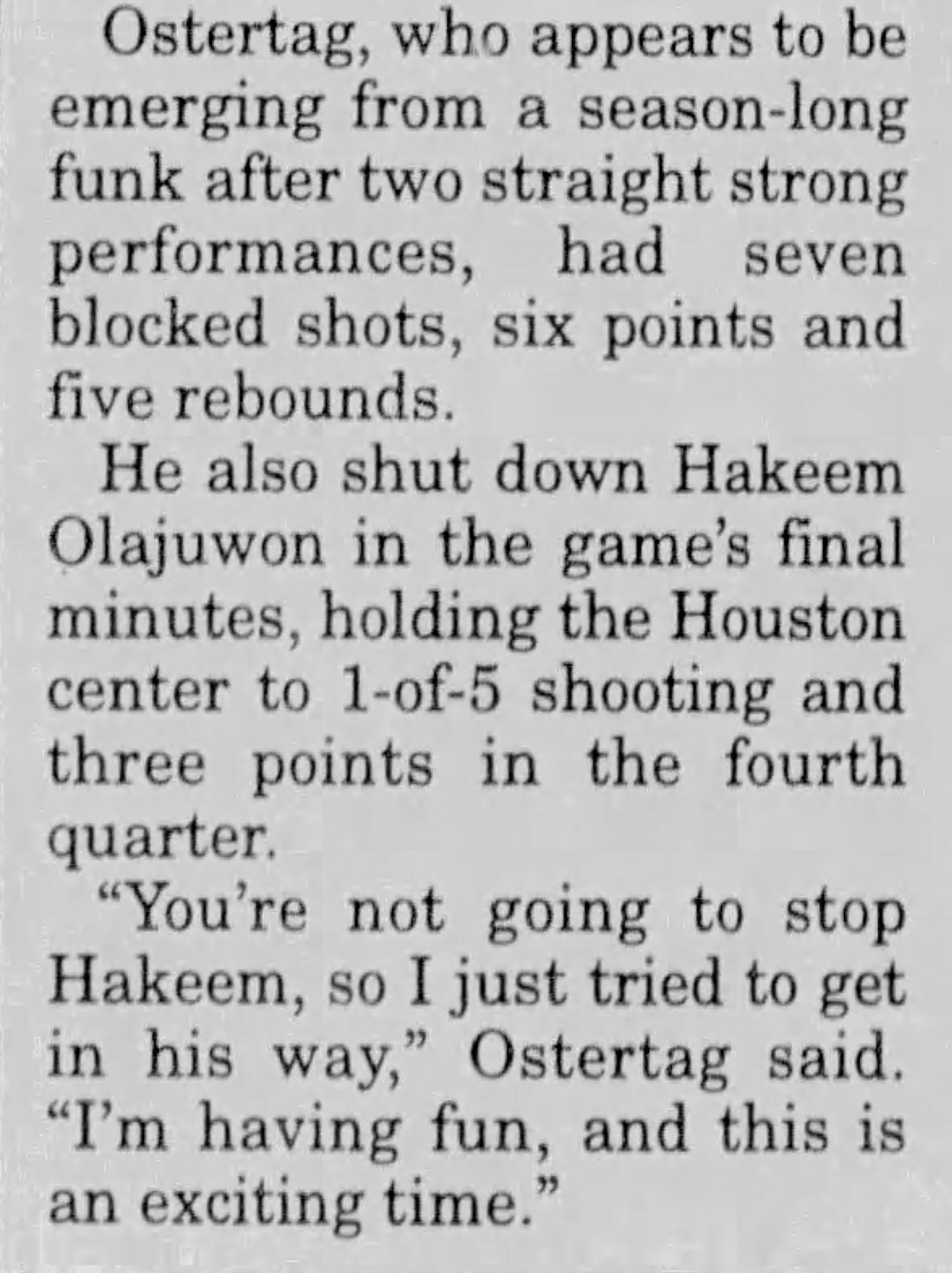
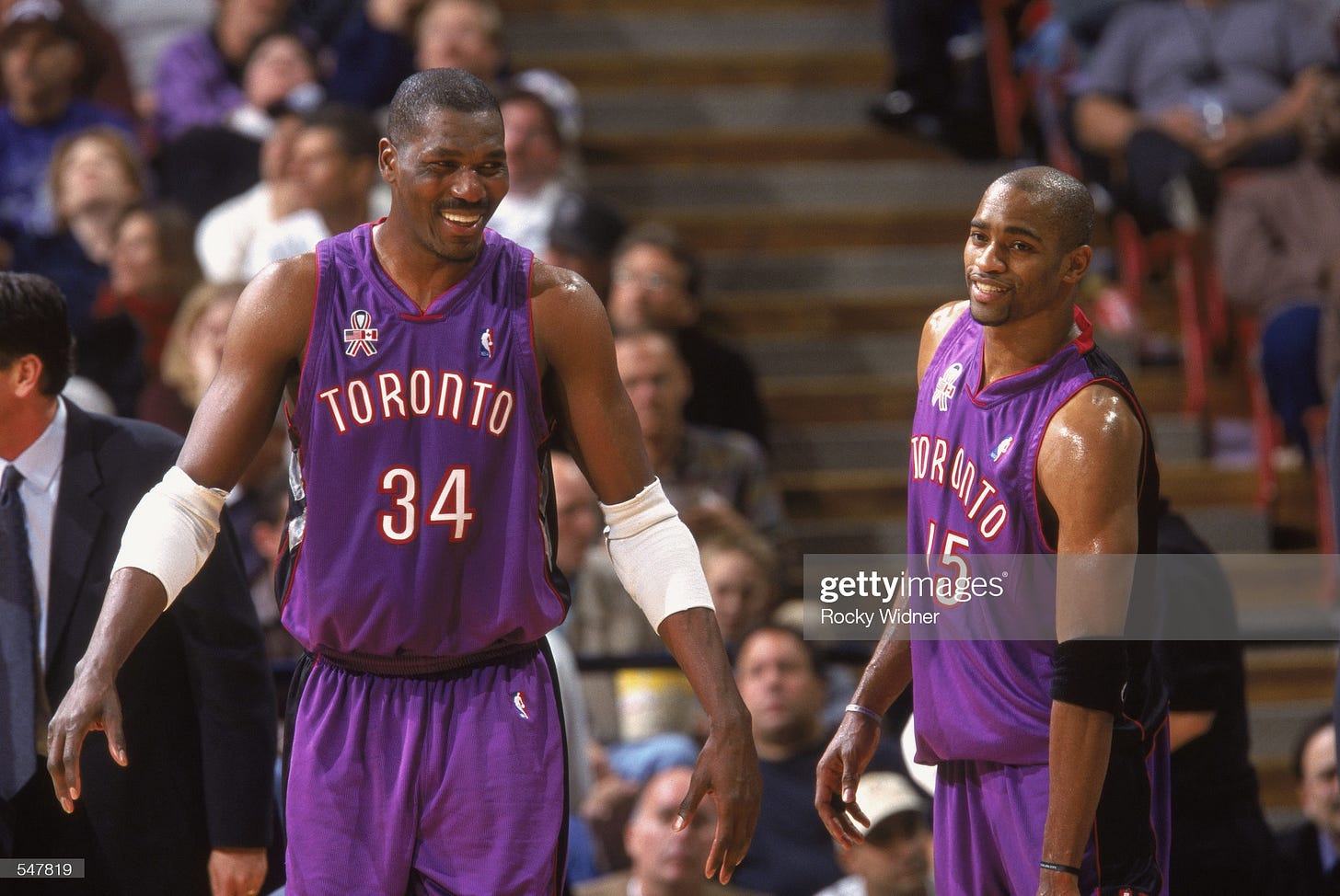
A great team isn't truly great without a decent supporting cast you moron= 1997 Utah Jazz.